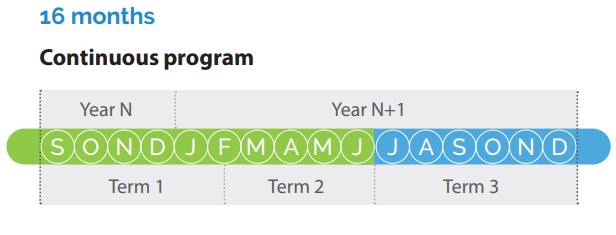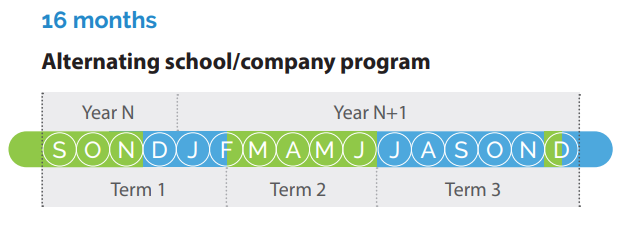
In brief
Presentation
Want to become a key actor in subsurface management issues and play a significant role in the energy transition?
Our program offers a cutting-edge and integrated training in geosciences and reservoir engineering, combining fundamental courses and practice on multidisciplinary industry case studies. You’ll be immediately operational upon graduation. A combined training course for a multitude of current and future job prospects: don’t wait, join us today!
Training objectives
The energy world is completely reshaped through the need to meet net zero carbon emissions by 2050 for preventing extreme climate changes. At the same time, the energy demand continues growing to accompany the development of many countries across the planet. In this context, the subsurface has to play a key role to help decarbonizing the energy mix, for example with the development of geothermal energy, geological sequestration of CO2, and underground energy storage. Besides such new usages of the subsurface, the exploitation of oil and gas will remain significant in the energy mix for the coming years.
The tools and technology used to characterize, model and monitor the subsurface are essential in any underground project (hydrocarbon exploitation, gas and hydrogen storage, geothermal project, etc.). Hence, the expertise of geoscientists and reservoir engineers are key factors of success. The program enhances your competencies both in geosciences and reservoir engineering, incorporating disciplines that will be necessary to deal with any subsurface project: geomatics, geomechanics, data sciences.
The content consists of a common core, including the necessary concepts and technologies in the various disciplines which are essential to evaluate and develop a subsurface-related project; it is followed by a topic-specific option that focuses on the emerging usages of the subsurface for the energy transition. Each of these options is based on a specific case study from the industry, and being supported by topic-specific courses. The integrated case study supporting each topic-specific option will allow you to apply the tools learned during the common core such as reservoir characterization, geological modeling, advanced reservoir simulation, production monitoring and optimization. The courses will be supported by practice on case studies using up-to-date software.
The topic-specific options will be mostly teamwork where you will be an active player of a multidisciplinary team, increasing your know-how in the management of an integrated subsurface project. IFP School is a cosmopolitan environment with students coming from every continent. We firmly believe that such a cultural blend stimulates student and faculty dynamics.
The key points of the program
Career prospects for graduates
Program & planning
Program content
Common core ~2/3 of the academic cursus
- Introduction to basin studies
- Reservoir geology
- Static modeling on a case Study
- Petrophysics & rock physics
- Well logging
- Geomechanics
- Geostatistics
- Data analytics & machine learning
- Geographic Information System (GIS)
- Reserves estimation
- Pressure - Volume - Temperature (PVT)
- Well testing
- Production mechanisms
- Reservoir simulation on a case study
- Geophysical methods overview
- Seismic interpretation
- Geophysical monitoring
Topic-specific options ~ 1/3 of the academic cursus
One topic to be selected among:
- Regional assessment of subsurface resources
- Underground gas storage
- Field monitoring and management
- Geothermal energy
In our training courses, the students work with a variety of industry-specific software.
We would like to thank PE Limited for providing us with PROSPER, GAP, PVTP and MBAL software, free of charge, as part of our partnership, equivalent to a donation of 2,531,162.74 GBP.
Program schedule
The two examples of schedules shown below correspond to the most frequently encountered
cases:
Another possible case for students in their penultimate year of a European school or university having signed a double-degree agreement with IFP School.
Career opportunities
Wide range of international opportunities:
- Exploration geoscientist
- Reservoir geoscientist
- Reservoir engineer
- Reservoir manager
- Geodata scientist



